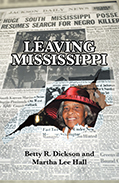
 |
It's nothing to Martha Lee to pick several hundred pounds of cotton a day when she's eight months pregnant. That is no excuse for a young sharecropper woman to shun a full day's work. Hitching mules to a plow when she's that far along is another story. But her husband, Jim, won't be doing that or anything else for her when he's jailed for murdering a white police officer in 1951. Nor is this the only loss Martha Lee endures following the shooting. Her baby daughter is stillborn a month later, and Jim is executed in a portable electric chair in 1952. By the time electrocution is deemed inhumane in 1955, Martha Lee is long gone, fleeing the sorrowful memories of Mendenhall, Mississippi. In the next seventy years, she shows how hard work, humor, and, above all, forgiveness can restore a fragmented life.
This is author Dickson's debut book. Martha Lee Hall, now ninety-three, vividly recounts to her the details of her relocation from Mississippi to Indiana and eventually to Michigan. It is one of the few surviving records of Jim Brent Durr's trial and execution, as most of the court records were later destroyed. The book deftly explains African American family dynamics, including why black women traditionally have so many children. It also offers the interesting fact that Durr's trial made history as the first time a black person sat on a jury in their county. Dickson, a white woman, repeatedly expresses how honored she feels to help Hall share her story. Her friendship is one of many that Hall, who never speaks ill of white people, even those who mistreated and executed her husband, enjoys with Caucasians, especially women. The messages of satisfaction in a job one loves and of overall contentment ring true on every page.